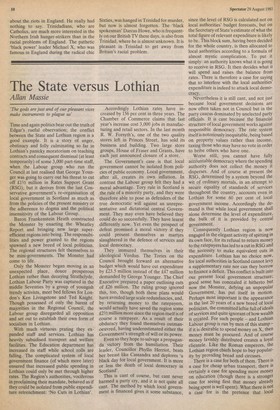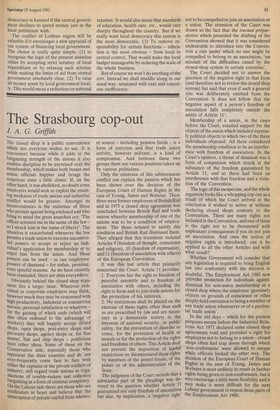The State versus Lothian
Allan Massie
'The gods are just and of our pleasant vices make instruments to plague us' Time and again politics bear out the truth of Edgar's rueful observation; the conflict between the State and Lothian region is a good example. It is a story of anger, obstinacy and folly culminating so far in Lothian's panicky moratorium on teaching contracts and consequent dismissal (at least temporarily) of some 3,000 part-time staff, when the Labour group who run the Council at last realised that George Younger was going to carry out his threat to cut off £11/2 million in Rates Support Grant (RSG); but it derives from the last Conservative government's re-organisation of local government in Scotland as much as from the policies of the present ministry or the adherence to dogma and the political insensitivity of the Labour Group.
Baron Frankenstein Heath constructed the Monster by enacting the Wheatley Report and bringing new large superefficient regions into being. The responsibilities and power granted to the regions spawned a new breed of local politician. The regional structures felt themselves to be mini-governments. The Monster had come to life.
Only the Monster began moving in an unexpected place, douce prosperous Lothian rather than decaying Strathclyde. Lothian Labour Party was captured in the middle Seventies by a group of youngish trendy activists, meet bed fellows for London's Ken Livingstone and Ted Knight. Though possessed of only the barest of majorities in the Regional Council, the Labour group disregarded all opposition and set out to establish their own form of socialism in Lothian.
With much virtuous prating they expanded staff and services. Lothian has heavily subsidised transport and welfare facilities. The Education department has increased its staff while school rolls are falling. The complicated system of local government finance (of which more later) ensured that increased public spending in Lothian could only be met through higher rates. The Region's authorities, vociferous in proclaiming their mandate, behaved as if they could be isolated from public expenditure retrenchment: 'No Cuts in Lothian'. Accordingly Lothian rates have increased by 156 per cent in three years. The Chamber of Commerce claims that last year's increase cost 3,000 jobs in manufacturing and retail sectors. In the last month R. W. Forsyth's, one of the two quality stores left in Princes Street, has sold its business and building. Two large store groups, House of Fraser and Grants, have each just announced closure of a store.
The Government's case is that local government cannot be isolated from policies of public economy. Local government, after all, creates its own inflation. In contrast the Labour group felt they had a moral advantage. Tory rule in Scotland is the rule of a minority party, and they were therefore able to pose as defenders of the true democratic will against an unrepresentative and dictatorial central Government. They may even have believed they could do so successfully. They have learnt differently now. Yet even the prospect of defeat promised a moral victory if they could present themselves as martyrs slaughtered in the defence of services and local democracy.
They immured themselves in their ideological Verdun. The Tories on the Council brought forward an alternative budget which would have cut expenditure by £23.5 million instead of the £47 million demanded by George Younger. The Chief Executive prepared a paper outlining cuts of £26 million. The ruling group ignored this, too, though both these plans would have avoided large scale redundancies, and, by returning money to the ratepayers, would actually have saved the region some £21/2 million more since the region itself is of course a ratepayer. As a result of their obduracy they found themselves outmanoeuvred, having underestimated either the Government's strength of will or its power. Even so they hope to salvage a propaganda victory from the humiliation. Their leader, Councillor Phyllis Herriot, beats her breast like Cassandra and deplores 'a black day for local government. It is more or less the death of local democracy in Scotland'.
This is cant of course, but cant never harmed a party cry, and it is not quite all cant. The method by which local government is financed gives it some substance, since the level of RSG is calculated not on local authorities' budget forecasts, but on the Secretary of State's estimate of what the total figure of relevant expenditure is likely to be. This block sum, having been decided for the whole country, is then allocated to local authorities according to a formula of almost mystic complication. To put it simply: an authority knows what it is going to receive in RSG. It then decides what it will spend and raises the balance from rates. There is therefore a case for saying that to interfere with the local authorities' expenditure is indeed to attack local democracy.
Nevertheless it is still cant, and not just because local government decisions are now often taken not in Council but in the party caucus dominated by unelected party officials. It is cant because the financial structure of local government works against responsible democracy. The rate system itself is notoriously inequitable, being based on property values rather than income, taxing those who may have no vote in order to bribe others who have one.
Worse still, you cannot have fully accountable democracy where the spending authority does not collect the money it disperses. And of course at present the RSG, determined by a system beyond the wit of ordinary mortals, in an. attempt to secure equality of standards of services throughout the country, accounts even in Lothian for some 60 per cent of local government income. Accordingly the demand is that while local government shall alone determine the level of expenditure, the bulk of it is provided by central government.
Consequently Lothian region is now engaged in the elegant activity of spitting in its own face, for its refusal to return money to the ratepayers has led to a cut in RSG and the necessity to make equivalent cuts in expenditure. Lothian has no choice now, for local authorities in Scotland cannot levy a supplementary rate nor can they borrow to finance a deficit. This conflict is built into our present local government structure; good sense has concealed it hitherto but now the Monster, defying an unpopular Government, has put itself in motion. Perhaps most important is the appearance in the last 20 years of a new breed of local politician, the committed leftie full of ideals of services and quite ignorant of how wealth is created. For such people — and Lothian Labour group is run by men of this stamp — if it is desirable to spend money on X, then money must be procured. And of course money lavishly distributed creates a loyal clientele. Like the Roman emperors, the Lothian region chiefs hope to buy popularity by providing bread and circuses. There is a case for both of them. There is a case for cheap urban transport, there is certainly a case for spending more money on education (though there is a stronger case for seeing first that money already being spent is well spent). What there is not a case for is the pretence that local democracy is harmed if the central government declines to spend money just as the local politicians wish.
The conflict of Lothian region will be valuable if it encourages a new appraisal of our system of financing local government. The choice is really quite simple: (1) to recognise the logic of the present situation either by accepting strict scrutiny of local expenditure or by relaxing such scrutiny while making the limits of aid from central government absolutely clear. (2) To raise all money spent by local government locally. This would mean a reduction on national taxation. It would also mean that standards of education, health care, etc., would vary sharply throughout the country. But if we really want local democracy this system is the most democratic. (3) To remove responsibility for certain functions — education is the most obvious — from local to central control. That would make the local budget manageable by reducing the scale of the whole business.
But of course we won't do anything of the sort. Instead we shall muddle along in our usual way, saturated with cant and rancorous inefficiency.



































 Previous page
Previous page